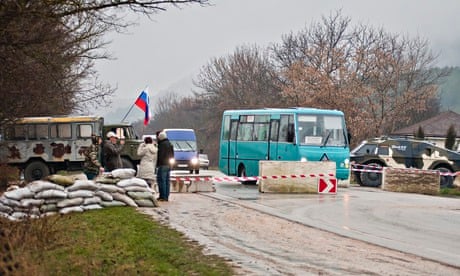Events in Ukraine are accelerating fast. On Wednesday, there were skirmishes in Crimea between pro-Russian demonstrators and Muslim Tartars. Over in Moscow, meanwhile, Vladimir Putin, ordered his military to conduct exercises in Russia's western district, a region which – coincidentally or not – borders Ukraine.
The rhetoric has grown more heated, too. Russian officials have claimed the rights of Russians in Ukraine are being severely infringed. Foreign minister Sergei Lavrov has dismissed opposition protesters in Kiev who turfed out president Viktor Yanukovych as ultra-nationalists and "pogromists". Prime minister Dmitry Medvedev has said Ukraine's new rulers are not legitimate.
Still, President Putin's latest war games do not mean Russia is planning a military intervention in Ukraine. Such a scenario is unlikely, but the Kremlin has plenty of other options short of full-scale invasion to stir up trouble for Ukraine's new European-leaning interim team, unveiled on Wednesday evening in Kiev, and to destabilise the government before it has even started.
The most obvious is to encourage pro-secessionist forces in Crimea. On Monday, pro-Russian demonstrators in the port of Sevastopol – the home of Russia's Black Sea fleet – staged their own "counter-coup", installing a Russian citizen as mayor and demanding union with Russia. The mood is febrile. The spectre is of Ukraine splitting up.
But Russia's simplest instrument of control is economic. As Andrew Wilson of the European Council of Foreign Relations puts it in a new briefing paper, Ukraine is on the verge of economic collapse. Ironically, he notes, this dire situation is "entirely self-inflicted". Foreign reserves are dwindling fast. The Ukrainian currency, the hryvna, is tumbling precipitously against the dollar, the graph of the two currencies resembling a ski-slope. But it isn't trade sanctions from Moscow that have taken Ukraine to the brink. Rather, Wilson argues, it was corruption by Yanukovych and his entourage, which sucked an estimated $8bn to $10bn from the economy between 2010 and 2013.
As a result, Ukraine is now staring into a fiscal black hole. Last December, Russia promised to bail out Ukraine with a $15bn bond-buying scheme plus a 30% cut in the country's gas price. In return Yanukovych scrapped plans to enter into a trade association with the EU, a move that sparked the street demonstrations which led to his overthrow two months later. Only $3bn of the loan was ever delivered. Moscow won't now pay the rest.
The International Monetary Fund has promised assistance, as have other EU states including the UK. But any new tranche of aid is only likely to materialise following elections for a new government in May.
In the meantime, the country, now run by a disparate, untested group of opposition politicians, hurtles towards default. The new acting president Oleksander Turchinov has indicated that his country needs $35bn for the next two years to avoid running out of cash.
"Ukraine is now broke and Russia can hit it hard," Wilson writes. "In the new situation, with Russian leaders already questioning the legitimacy of the new authorities, the most likely levers of Russian economic pressure – higher gas prices, reduced lending, call-back of loans and export restrictions – can cause immense damage. At this stage, Russia is weighing which options to use, but the pressure will undoubtedly be felt soon."
The Kremlin's most significant weapon is gas. Twice, in 2006 and 2009, Moscow halted the supply of gas exports to Ukraine in bitter disputes with the country's then pro-western orange leadership. Russia's Gazprom could now demand that Ukraine settles its outstanding gas import bills – about $1.6bn so far for 2014 and 2013. It could also insist that Ukraine pays its bill promptly, or in advance.
Moscow might also justifiably claim that Kiev has broken the controversial contract agreed by the then prime minister Yulia Tymoshenko in 2009, which commits Ukraine to paying for huge volumes of gas – 34bn cubic metres a year – whether it uses it or not. This winter it has used significantly less.
In this game of brinkmanship, Ukraine has a few cards of its own. Between 60% and 80% of Russia's natural gas exports to the EU transit via Ukraine. The last energy war in 2009 choked off supplies to much of Europe, badly damaging Gazprom's reputation with furious EU clients.
Lilit Gevorgyan, senior economist at IHS Global Insight, says: "Ukraine is not just a victim. They can create problems for Gazprom. There can be interruptions in gas supplies to the EU."
A Ukrainian default would also damage Russian investments in Ukraine, she adds. Russian banks have pumped substantial sums into Ukraine's defence, nuclear and agricultural sectors, and will not want to lose their capital.
So the country's new temporary leaders faces a series of impossible choices. If they pursue IMF-friendly policies, this will make them extremely unpopular. If they do not, the economy faces meltdown.
"The situation is dire. If the IMF insists on austerity it will destabilise the country anyway. Things will get worse before they get better," Gevorgyan says. "The question is if the country will accept this when people are not united. Is it really the right time to carry out reforms?"

Comments (…)
Sign in or create your Guardian account to join the discussion